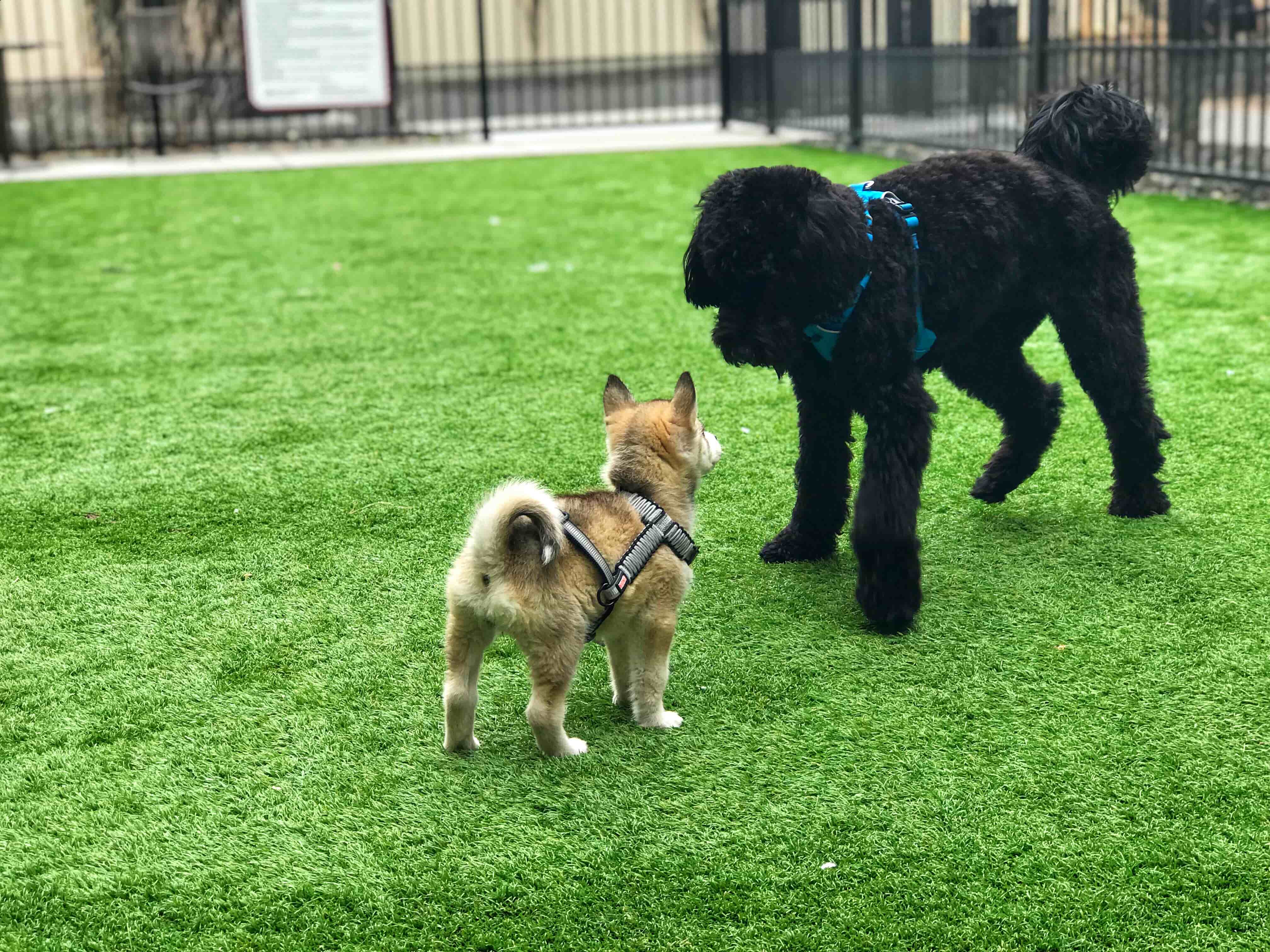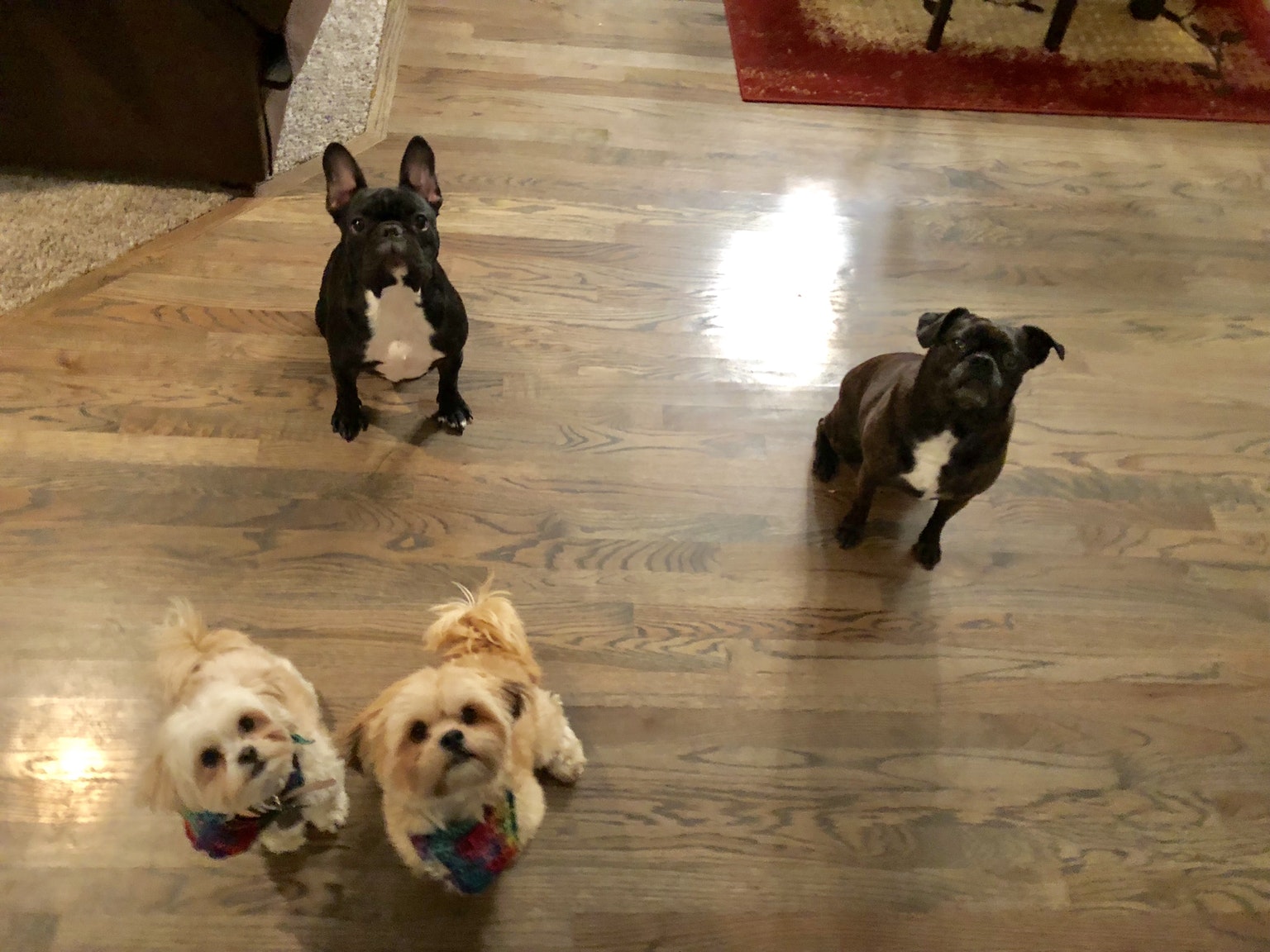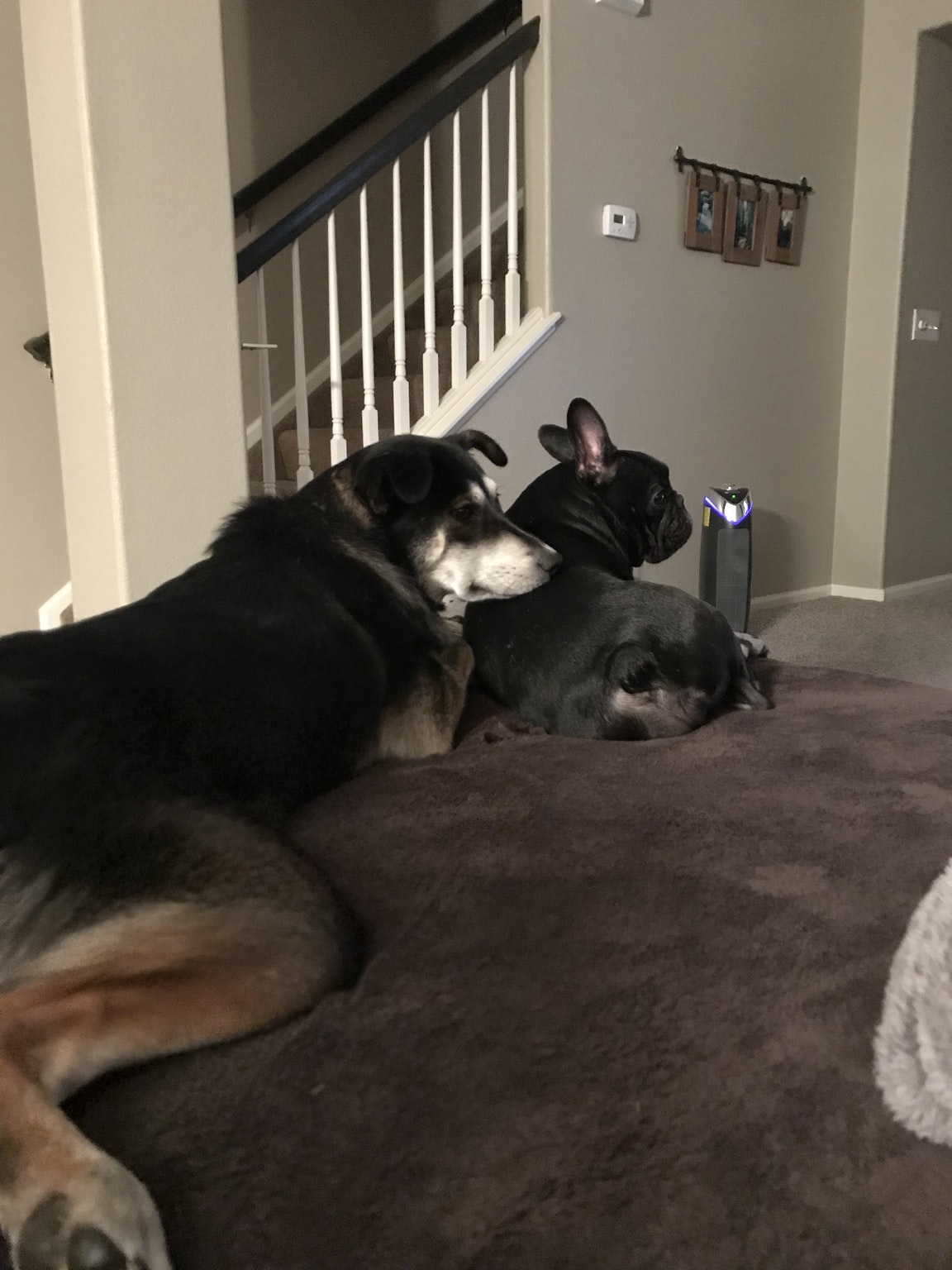Why it’s never too late to socialize your dog

Adding a furry friend to your family is such an exciting time!
Whether you’re bringing home your 8-week old puppy or bringing home an adult dog that you rescued – socialization is important.
Dogs can be socialized at any time of their life, but it’s most important when they’re between the age of 8 weeks and 4 months old.
Dog socialization includes making your dog stress free with a variety of people and different environments and circumstances.
The benefits are not only for your pup but you too. No matter if I am taking my dogs for a walk, letting them run around at the dog park or taking them to a restaurant, I feel comfortable and at ease knowing that they can confidently handle interacting with others.
While I’ve socialized my dogs from a young age it’s never too late to socialize your dog! Let’s take a closer look at this process; what, when, why, and how.
What is dog socialization?
Socializing your dog is when you start preparing your pup to enjoy and have positive experiences with different environments and other animals, people, and activities.
Importance of socializing your dog
Socialization is such an important part of your pup’s relaxed life. Socialized dogs are typically happier, more approachable, and able to handle stress better.
Dogs that are not as socialized can become shy, anxious, and sometimes even aggressive out of fear because they don’t have the social skills to deal with new situations or people.
How to socialize an adult dog
Typically puppies like to interact with large groups of dogs and play at dog parks. However, adult dogs that haven’t been exposed to other dogs from a young age can get anxious in dog park settings.
You might be facing this problem if you’ve recently adopted an adult dog. When you try to bring them out but notice they get shy, anxious, or fearful around other dogs, then you’ll want to follow these guidelines to help them break old behavior habits and put them at ease. With older dogs, I suggest exercising extreme patience when it comes to socialization. Old habits can be tough to break.
Start socializing slowly. Keep it positive.
Walking your dog daily allows them to see and meet other furry friends. You’re more likely to see people and other dogs while you’re on a walk than you are sitting at home with your pup.
Always remain calm and assertive when your dog is meeting other people or animals. If you see behavior that needs correcting; don’t be afraid to distract and correct them with a quick tug on the leash.
Also, praise your canine when they have a favorable interaction. Stay positive with every encounter! Your dog feeds off of your energy.

Tyson & Mylie on a playdate with Blanca and Chewy
Dog playdates
You can always start by introducing your adult dog to a new dog one at a time.
Invite a friend or family member over with their dog for a walk with your dog. Introduce them slowly by walking with a slight distance between the dogs. This will allow the dogs to get acquainted with each other in a non-territorial environment.
If both dogs seem relaxed during the walk, allow them to sniff each other while keeping the leashes loose. This interaction will give you a sense of how the dogs will interact off-leash together.
If both dogs seem relaxed then try off-leash in a fenced-in yard. The key is to keep the interaction short then slowly add more time to the interactions. If this doesn’t work, look into a local dog training class to help supplement what you are working on. Don’t give up!
Dog parks and doggy daycare
If your canine is relaxed after taking walks and meeting new pups then the dog park is the next step in their socialization plan.
Keep them on a leash and expose them slowly. You can do this by walking them around the outside of the fence and letting them see the other dogs. Pay attention to how your dog is reacting to the other dogs, and slowly work your way into the dog park.
Once you are comfortable enough to take your pup inside the fence, you can keep them on a leash until they relax. Each step is an improvement, reward your pup with treats!
A nice way to complement the social setting at a dog park is enrolling them in doggy daycare once a week. This should become a routine and will strengthen their social skills. You never know when your pup will meet a friend and become best buds.
Remember, don’t rush things, introducing one new activity every couple of weeks will help them relax in different environments over time.
Puppy socialization
Puppies should be exposed to a wide range of different sounds, smells, and environments. This allows them to be less fearful of unfamiliar things and it allows them to become confident dogs as they grow.
Puppies who are not socialized at a young age can feel anxiety, fear and aggression more easily. This can lead to behavioral issues later in their life. Most dog owners will find easier success in socialization if you begin early in your dog’s life and start building a positive association with the act of socializing with other dogs and humans at an early age.

Tyson with one of his best friend Lakota!
When to start socializing your puppy
Your breeder will start training your pup young – as early as three weeks old. But from 8 weeks to about 4 months, your pup goes through a socialization period. During that time the exposure to other puppies and people shapes their personality and how they will react to things as an adult.
As mentioned, slowly exposing them to a variety of people, places, and situations early on makes a huge difference in the future.
You’re laying the groundwork for your pups’ behavior. Let them approach new things on their own and have patience. They are naturally curious and will want to explore. That’s how they learn about their environment.
Different ways to start
There are a lot of ways you can socialize your pup. It’s up to you to make time to find new experiences for them. Here are some ways to start socializing them.
Human contact
Puppies should be held by as many different people as possible. Be gentle but have them hold the pup in different positions, and make sure the pup is comfortable with people petting their back, head, feet, and ears.
Try to avoid doing too much too fast. For instance, if you want your puppy to get acquainted with being handled by multiple people they don’t know, start with a few family members or friends. Slowly integrate one, then two, and so on.
Try different locations
After your pup gets acquainted with different individuals you can start taking them to experience different environments. There are a lot of places you can take your young canine here are just a few:
- Puppy parties – Ask your friends and family to bring over their pets and have a puppy playdate.
- Pet stores – Walk them around the store to meet new people and pets. Let them sniff and explore the different toys.
- Restaurants and cafes– Take them to an outdoor restaurant that has tons of new smells and people. The more relaxed they see you are the better.
- Parks and trails – Ask children and adults to pet your young dog; this will also give them exercise. Let them explore!
- Car rides - My dogs love going for car rides even if it’s for ten minutes. I take my dogs with me when I need to run errands to help them experience the car and different environments.
Feeding time
To help prevent guarding of the food bowl, approach your pup while they are eating. Try to do this a few times while they are eating to prevent them from getting into a habit of feeling anxious about others approaching their food.
Alone time
Leave your pup alone at least once a day. This will help break any attachment that could lead to separation anxiety. Part of raising a healthy and happy dog is making sure that they have the ability to be comfortable in multiple situations.
Other animals
Your pup can benefit from being socialized to bigger and smaller animals such as Cats, different-sized dogs, horses, rabbits, birds, and chickens.
Expose your puppy to water
Getting your dog outside and around water, especially during the summertime is not only great exercise but a great exposure activity for them. Bring them around things like Pool, hose and sprinkler, beach or lake, rain, and bath time.
Sights, sounds, and people
Have your young dog interact with different sounds including Thunder, lightning, sirens, fireworks, traffic, car horns, trains, trucks, doorbells, television, telephone ringing, and knocking at the door.
Have their paws touch different surfaces including Grass, hardwood, tile, sand, carpet, stairs, gravel, elevator, and escalator.
Have your pup meet different men and women that have: beards, glasses, hats, sunglasses, helmets, and jewelry.
Dog training classes
Give puppy training classes a try! Once your pup has started their vaccinations, they can attend puppy classes. Classes not only help your pup begin to understand basic and intermediate commands but can also help expose them to other dogs and people.
Skilled trainers typically facilitate the meetings so that all dogs and people are safe and having fun during the session. Ask your vet if they recommend a local dog trainer or see if there are classes available at your local pet store.
Don’t forget to give your pup treats when they perform and behave well!
Importance of continuing to socialize your dog
You’ll want to continue to expose your pooch to different social settings and experiences their whole life. Socializing them as a puppy and through to adulthood is one of the best ways to ensure that they become a confident, stress-free adult.
Remember, don’t force your dog into any situation they don’t want to be in, stay positive, and always have treats on you!
It’s never too late to polish their social skills!
